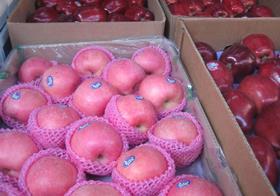
India is putting a temporary hold on apple and pear imports from China with effect from 1 June, citing persistent interceptions of quarantine pests at ports of entry.
In a letter dated 1 May addressed to You Quan Chen at China’s office of plant protection, Ashwani Kumar, joint secretary in India’s Ministry of Agriculture, said that while India’s National Plant Protection Organisation (NPPO) had provided Beijing with regular communication of quarantine non-compliance on Chinese imports, it had seen no improvement in the situation. Ongoing interceptions of mealy bug on apples and pears indicated a failure of China’s phytosanitary control system, the letter said.
India’s NPPO sent a list of 26 non-compliance cases for the interception of quarantine pests on 31 March, the letter said, but it received no response from Beijing. China has now been requested to submit details of standard operating procedures to mitigate the phytosanitary risks; the procedure for approval of packhouses; registration procedures for orchards; and action/phytosanitary measures taken to avoid such further interceptions. The NPPO has proposed to send a delegation to China to visit orchards and packhouses to verify the procedures.
Bumper year for Chinese imports
Sources in the trade suggested the temporary ban is an attempt to control the volume of Chinese apples entering India, following a deluge of arrivals over the past eight months.
Between mid-October and the end of April, India has imported some 170,000 tonnes of apples, with China accounting for almost 70 per cent (117,000 tonnes) of the volume, according to Tarun Arora of major importer IG international.
“This season, India’s apple imports are expected to reach around 300,000 tonnes and China would make up around 200,000 tonnes of that volume, based on current trends,” Arora told Asiafruit.
“We still might finish at that number considering the ban will only take effect from 1 June. This is very late in China’s season, and arrivals of imports are expected to be low in June due to the Indian apple crop starting early.”
Arora warned competing suppliers of imported apples that the suspension of Chinese imports did not signal an opportunity for the current season. “Thinking of this as an opportunity to ship might turn out to be a very big mistake for this season,” he said. “The ban will definitely grow volumes from other Northern Hemisphere origins in a big way for next year though, if it continues.”
Keith Sunderlal of The SCS Group, which represents the Washington Apple Commission in India, said he did not envisage any positive impact for the current US campaign. “Importers will bump up loading of Chinese imports during the next 10 days to get in by 1 June,” he noted.
Poland could be the big beneficiary of China’s market absence, Sunderlal predicted. “Personally, I think this is a bonanza for Poland – it opens up the lower end of the market for them. Even for next year, it might only lead to an increase of say 10 per cent in sales for Washington, but it will help with the early presence in the market.”
The import suspension would come at a hefty commercial cost to China’s apple industry, with Arora estimating the value of this year’s exports to India, on course to reach 200,000 tonnes, at around US$200m.
Imports would be limited during June because supplies of storage apples in China are already depleted, but the impact of the ban could become much bigger if it continues.
May/June have typically been the peak months for India’s apple imports, according to analysis from Fresh Intelligence Consulting, with volumes topping out at around 45,000 tonnes per month.
“Banning China from 1 June is right in the middle of their peak supply window based on the last three years,” said Fresh Intelligence Consulting’s Wayne Prowse. “The suspension might help to stem the larger flow from China ahead of the Indian apple season, which tends to peak from August to November.”
China shipped 125,134 tonnes of apples to India in 2016, making up over half of the total imports of 246,808 tonnes. That marked a huge rebound after a low supply year in 2015 saw China's share shrink to just 15 per cent (shipping 27,459 tonnes out of total imports of 193,692 tonnes), with the US filling the void.






No comments yet